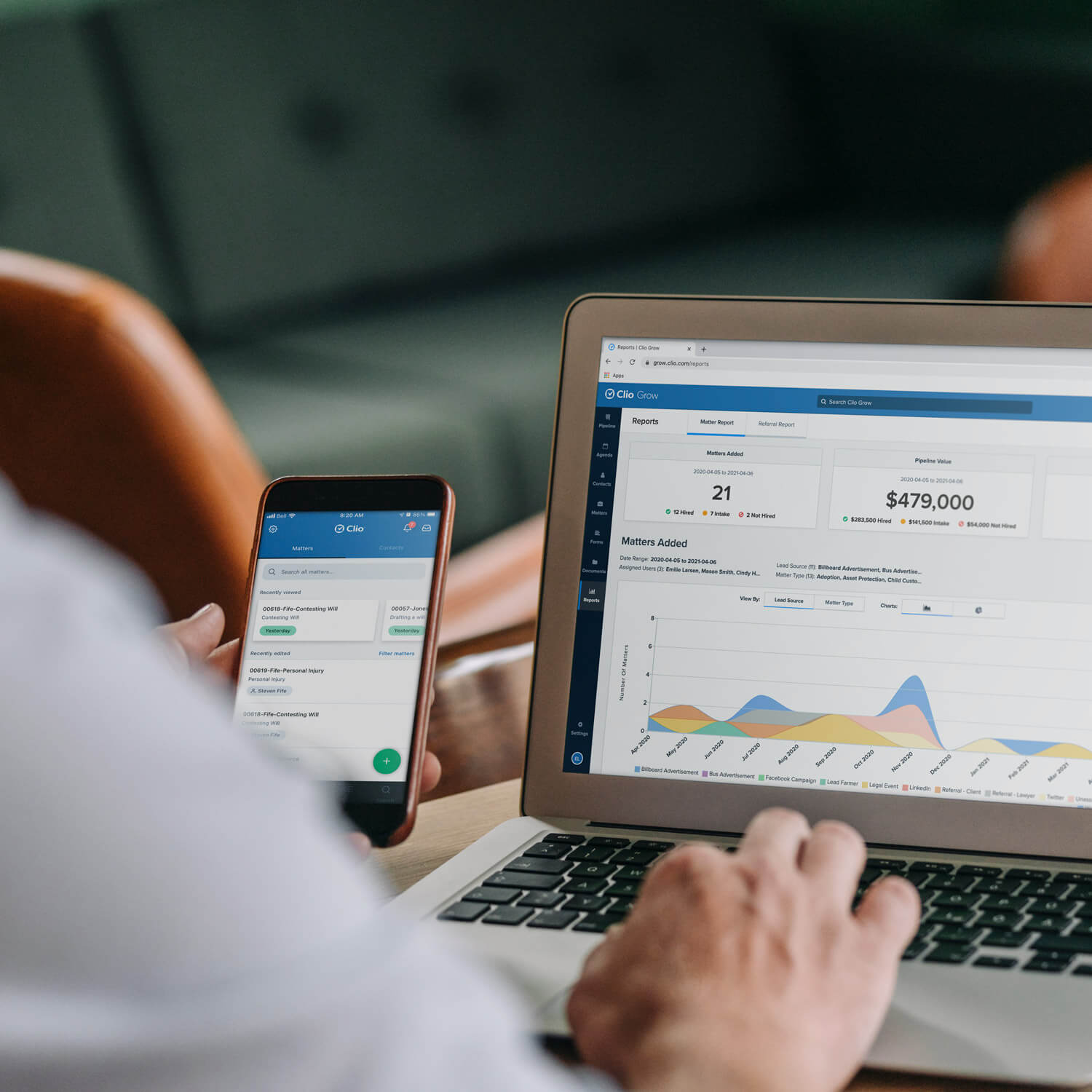There are many different types of legal software, and all of them can provide endless benefits for your firm. However, it can be hard to know which vendor is the best choice.
Assessing new technology can be an extensive undertaking. That’s why we’ve outlined the types of legal software, their benefits for law firms, and how to choose a legal technology provider that best meets the needs of your firm.
We’ve also included an easy-to-use checklist to help you along your journey.
Key benefits of legal technology
According to legal technology research, the average lawyer billed just 2.5 hours of an eight-hour day. That’s an average utilization rate of 31%.

Where does all the non-billable time go?
The answer: Backoffice administration, accounting, configuring technology, sending out bills, and payment collection—these are just a handful of tasks that eat away at time that could be spent on billable tasks.
Attorneys can increase their firm’s utilization rate and reconcile those inefficiencies. By implementing legal software, firms see:
- Automation: Automating time-consuming tasks such as client intake saves your staff time and makes for a smoother, client-centered client experience.
- Better collaboration: With tools like cloud-based law practice management software, all key matter information is in one place. Anyone can work on a matter together with information that is always updated in real-time.
- Integrated systems: The best tools integrate directly with each other. You’ll never have to enter in important data twice, or waste time in multiple systems. A legal phone system is one example of technology that can integrate with your legal practice management software.
- Work from anywhere: With the rise of cloud computing, lawyers can now run their practices from anywhere, so you can practice whenever and wherever you’re most efficient.
- Streamlined payments: The same legal technology research also found legal professionals who accept online credit card payments get paid 39% faster than those who do not. In other words, with the right legal payment processor, technology gets you paid faster.
What types of legal software systems do law firms use?
There are many different types of legal software systems, and each of them can help you handle the increasing demands of your law firm.
Some of these systems offer one service, some offer multiple, and others provide an all-in-one solution.
Case management software
Law Practice Management (LPM) software is a system that manages each aspect of your law firm. These systems provide a single, cloud-based source of truth where firms can store, access, and manage key client data.
Though the features will vary from product to product, the best case management software will come with a whole gamut of features, including:
- Case notes
- Contact information
- Basic timekeeping and billing
- Matter management
- Appointments
- Client communications
- Calendaring
- Trust accounting
- Form/document assembly
Billing and tracking software
Whether you’re billing by the hour, charging flat fees, or on a contingency basis, knowing where your time is going is the best means to ensure the profitability of your work.
The problem is that, ironically, it takes time to track time. This is where billing and tracking software helps. After all, lawyers need to track their hours as effectively and accurately as possible to reach their targets.
By automating and simplifying lawyer time tracking with software, firms can save time, improve tracking and billing accuracy, and increase productivity by revealing day-to-day inefficiencies in their processes. The best software will usually provide helpful tools or templates to help lawyers better track time for invoicing.
Document management and automation software
Whether you work in the legal industry or not, you’re probably well aware of the copious amounts of paperwork that lawyers need to work through. It’s tedious and time consuming.
Document management and automation allows law firms to automate document creation with the help of intelligent templates, saving precious time and resources for practices.
These types of legal software provide a centralized process of producing letters, agreements, motions, pleading, bills, invoices, and other legal documents. Document automation helps in creating a high volume of documents in a short period of time while being compliant and maintaining a consistent brand.
Online payment processing
Law firms that don’t offer payment processing solutions are a dealbreaker for some consumers—with 40% saying they wouldn’t hire a lawyer that didn’t take credit or debit cards.
An online, legal payment solution is another type of legal software system, one that puts you ahead of the competition. Generic solutions like Paypal or Stripe are not built specifically for law firms nor meet the requirements to be compliant with trust accounting rules. This is why legal professionals look to legal software that provides native payment options.
The bottom line is, no matter the size of your law firm, legal software systems can eliminate a lot of inefficiencies and stressors—so long as it’s the right technology and fit for your office.
Want more? We dive deeper on this topic by outlining 6 ways legal technology is used at firms.
Assessing your law firm’s needs
When it comes to evaluating all the types of legal software, many firms canget overwhelmed by the number of legal technology providers and their specializations. Lawyers also tend to focus on selecting technology for a short term fix, rather than thinking about growth and scalability over the long term.
For example, it’s common for firms to identify tracking billable hours as a pain point and try to find a tool that automates time tracking for lawyers. While that may work for the short term, the problem then becomes entering those hours into an accounting program and calculating billing costs for each client.
An all-in-one legal practice management software scales with your law firm as you grow and helps firms create more streamlined workflows. Instead of having your time tracking, accounting, and billing data in three different places, an all-in-one tool pulls it all together so you can manage everything in one place.

With this in mind, as you build your requirements list on your search for the right legal technology provider, ask yourself these questions:
- What are the pain point(s) that my firm is currently facing?
- Where are the process shortfalls?
- Is it easy to keep track of documents and update them in real-time?
- Am I satisfied with how long it takes to bill clients and collect payments?
- Is it easy to keep track of client information?
- Is the way I’m keeping track of tasks working or can it be more efficient?
- Is it easy to collect signatures from clients?
- Do I spend a lot of time intaking clients and going back and forth to book appointments?
If you’re struggling or second-guessing yourself with the answers to three or more of these questions, this is your sign to look for a more comprehensive practice management software provider.
Considerations when choosing a legal technology provider
Each legal technology provider has pros and cons—so before you jump in, it’s important to consider your law firm’s priorities and business needs. Here are the most important criteria to consider when choosing the best vendor for your law firm.
Product
Evaluate whether a legal technology provider is offering features you need. Ask yourself if the features will drive value for your firm (e.g. automated client intake, document management, payment processing). While there are standard features across practice management software, different vendors will have their unique offerings.
Integrations
Having your client data and workflows in one place will save you time and reduce potential data duplication. Therefore, it’s important to consider whether the legal technology provider you’re evaluating has integrations that work with your current systems such as Outlook, Google Drive, WordPress, and so on.
Security
Lawyers need to operate under strict security rules, such as the duty to protect client information. Ask legal technology providers which encryption methods they use, where the servers used to store data are, and how often they back up data. If you plan to host your own servers through an on-premise solution, be aware that you may be at greater risk for disruption in the case of a fire, flood, earthquake, or other disasters.
Ease of use
This not only encompasses how easy legal technology is for your staff to use on a day-to-day basis, but also how easy set-up, implementation, and customization are for your firm. Many legal technology providers offer free trials, make sure to take advantage of these offers to see which one has the most intuitive user interface.
Support
Having responsive, readily available support is important when you’re dealing with client matters. Using any kind of new legal technology usually comes with a learning curve. If you have a question or need help, you should be able to easily contact your legal technology provider.
Deployment options
Choosing on-premise or cloud-based deployment will depend on where you want to store your data. With on-premise solutions, you’re responsible for storing data and maintaining servers, while cloud-based deployment stores data on the legal technology provider’s database.
On-premise is a more traditional software model and all the information is limited to the firm office, which means that access, sharing, and backing up needs to be done in the office. In comparison, the newer cloud-based software model, allows users to access practice management software through any web browser, from any device, on any network.
Keep in mind that on-premise software often comes with more risk and cost. Firms are often responsible for hosting, updating, and backing up their own data as well as fulfilling any data storage compliance requirements as outlined by your jurisdiction.
Pricing
The cheapest legal technology provider is not always the best one for your firm. Each vendor will offer different pricing plans, but it’s important to not take the price at face-value and understand the return on investment you’ll get.
It’s also important to consider the terms of payments. Some providers will only offer annual plans while others have flexible, monthly plans with an option for annual plan that usually comes with a discount.
Contractual obligations
Many legal technology providers will have a minimum commitment period. This means that firms are locked into a contract for a certain time (usually annually or even multi-year) with unfavorable cancellation terms—even if it turns out to be a bad fit for the firm.
The length of these contracts vary between one, three, or even five years, and are often associated with on-premise legal technology providers. This is because on-premise software requires much more maintenance than cloud-based software which leads to the terms of the contract becoming more complex.
When evaluating a legal technology provider, read their cancellation policies carefully and steer clear of vendors with long-term contracts.
Final thoughts on the different types of legal software
Choosing a new app or service for your law firm can be overwhelming. However, the right case management software can make your firm more efficient and profitable than ever before, so the time and effort it takes to evaluate all the types of legal software is definitely worth the effort.
Remember that the goal of legal technology is ultimately to help your firm run better and more efficiently, so you can spend more time focusing on practicing law. The best way to achieve that goal is to ask legal technology providers the right questions along the way. Finding the right provider will become clearer and easier as you move forward.
Want more? Read our post on 10 Things to Consider Before Choosing Case Management Software.


